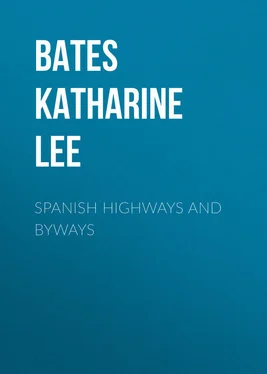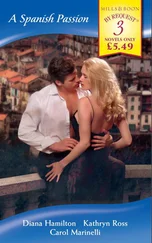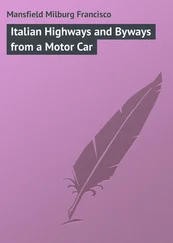Katharine Bates - Spanish Highways and Byways
Здесь есть возможность читать онлайн «Katharine Bates - Spanish Highways and Byways» — ознакомительный отрывок электронной книги совершенно бесплатно, а после прочтения отрывка купить полную версию. В некоторых случаях можно слушать аудио, скачать через торрент в формате fb2 и присутствует краткое содержание. ISBN: , Жанр: foreign_antique, foreign_prose, Путешествия и география, на английском языке. Описание произведения, (предисловие) а так же отзывы посетителей доступны на портале библиотеки ЛибКат.
- Название:Spanish Highways and Byways
- Автор:
- Жанр:
- Год:неизвестен
- ISBN:http://www.gutenberg.org/ebooks/38767
- Рейтинг книги:5 / 5. Голосов: 1
-
Избранное:Добавить в избранное
- Отзывы:
-
Ваша оценка:
- 100
- 1
- 2
- 3
- 4
- 5
Spanish Highways and Byways: краткое содержание, описание и аннотация
Предлагаем к чтению аннотацию, описание, краткое содержание или предисловие (зависит от того, что написал сам автор книги «Spanish Highways and Byways»). Если вы не нашли необходимую информацию о книге — напишите в комментариях, мы постараемся отыскать её.
Spanish Highways and Byways — читать онлайн ознакомительный отрывок
Ниже представлен текст книги, разбитый по страницам. Система сохранения места последней прочитанной страницы, позволяет с удобством читать онлайн бесплатно книгу «Spanish Highways and Byways», без необходимости каждый раз заново искать на чём Вы остановились. Поставьте закладку, и сможете в любой момент перейти на страницу, на которой закончили чтение.
Интервал:
Закладка:
Yet it is strange how homely are many of the memories that spring to life in me at the name of the Alhambra, – decorous donkeys, laden with water-jars, trooping up the narrow footpath to the old Fountain of Tears, herds of goats clinging like flies to the upright precipice, a lurking peasant darting out on his wife as she passes with a day's earnings hidden in her stocking and holding her close, with laughter and coaxing, while he persistently searches her clothing until he finds and appropriates that copper hoard, and our own cheery little house-drudge washing our linen in a wayside rivulet and singing like a bird as she rubs and pounds an unfortunate handkerchief between two haphazard stones: —
"I like to live in Granada,
It pleases me so well
When I am falling asleep at night
To hear the Vela bell."
There is the proud young mother, too, whom we came upon by chance over behind the Tower of the Princesses, where her pot of puchero was bubbling above a miniature bonfire, while the velvet-eyed baby boy sucked his thumb in joyous expectation. She often made us welcome, after that, to her home, – a dingy stone kitchen and bedroom, unfurnished save for pallet, a few cooking-utensils, a chest or two, and, fastened to the wall, a gaudy print of La Virgen de las Angustias , the venerated Patrona of Granada. But this wretched abode, the remains of what may once have been a palace, opened on a lordly pleasure-garden with walls inlaid with patterns of rainbow tiles, whose broken edges were hidden by rose bushes. There were pedestals and even fragments of images in this wild Eden, jets of sparkling water and walks of variegated marble. In the course of the month, English and Spanish callers climbed the hill to us and encompassed us with kindness, but we still maintained our incorrigible taste for low society and used to hold informal receptions on sunny benches for all the tatterdemalions within sight. Swarthy boys, wearied with much loafing, would thriftily lay aside their cigarettes to favor us with conversation, asking many questions about America, for whose recent action they gallantly declined to hold us responsible. "It was not the ladies that made the war," said these modern cavaliers of the Alhambra.
Their especial spokesman was a shambling orphan lad of some fifteen summers, with shrewd and merry eyes. Nothing pleased him better than to give an ornamental hitch to the shabby, bright-colored scarf about his thin, brown throat, and proceed to expound the political situation.
"You admire the Alhambra? I suppose you have no palaces in America because your Government is a republic. That is a very good thing. Our Government is the worst possible. All the loss falls on the poor. All the gain goes to the rich. But there are few rich in Spain. America is the richest country of all the world. When America fought us it was as a rich man, fed and clothed, fighting a poor man weak from famine. And the rich man took from the poor man all that he had. Spain has nothing left – nothing."
"Oh, don't say that! Spain has the Alhambra, and beautiful churches, beautiful pictures."
"Can one eat churches and pictures, my lady?"
"And a fertile soil. What country outblooms Andalusia?"
His half-shod foot kicked the battle-trampled earth of the immortal hill contemptuously.
"Soil! Yes. All the world has soil. It serves to be buried in."
This budding politician graced us with his company one Sunday afternoon, when we went down into Granada to see a religious procession. Our Lady of Lourdes, escorted by a distinguished train of ecclesiastical and civic dignitaries, with pomp of many shining lights and sonorous instruments, with peal of church bells and incongruous popping of fireworks, passed through extended ranks of candle-bearing worshippers, along thronged streets, where every balcony was hung with the national red and yellow, to the Church of Mary Magdalene. There the sacred guest was entertained with a concert, and thence conducted, with the same processional state, amid the same reverent salutations of the multitude, back to her own niche. Our youthful guide showed himself so devout on this occasion, kneeling whenever the image, borne aloft in a glory of flowers and tapers, passed us, and gazing on every feature of the pageant with large-eyed adoration, that we asked him, as we climbed the hill again, if he would like to be a priest. But he shrugged his shoulders. "There are better Christians in Spain than the priests," he answered.
The son of the house, Don Pepe, a young man of five and twenty, who usually attended us on any difficult excursion, was also frankly outspoken in his disapproval of the clergy. He could hardly hold his countenance in passing a Franciscan friar. "There walks the ruin of Spain," he muttered once, with bitter accent, turning to scowl after the bareheaded, brown-frocked figure so common in Granada streets. We had, indeed, our own little grudge against the friars, for they were the only men of the city who forced us off the narrow sidewalks out into the rough and dirty road. All other Granadines, from dandies to gypsies, yielded us the strip of pavement with ready courtesy, but the friars, three or four in Indian file, would press on their way like graven images and drive us to take refuge among the donkeys.
This escort of ours, formally a Catholic, was no more a lover of State than of Church. He was eager to get to work in the world and, finding no foothold, charged up his grievance against the Government. He was firmly persuaded that Madrid had sold the Santiago and Manila victories to Washington for sums of money down, – deep down in official pockets. But his talk, however angry, would always end in throwing out the hands with a gesture of despair.
"But what use in revolutions? Spain is tired – tired of tumult, tired of bloodshed, tired of deceit and disappointment. A new government would only mean the old dogs with new collars. We, the people, are always the bone to be gnawed bare. What use in anything? Let it go as God wills."
The Silvela and Polavieja ministry came in during our stay at Granada, and the Liberal and Republican chorus against what was known as the Reactionary Government swelled loud. "It means the yoke of the Jesuits," growled our burly host. Our Alhambra dream suffered frequent jars from these ignoble confusions of to-day. When we were musing comfortably on the melancholy fortunes of Boabdil, a cheap newspaper would be thrust before our eyes with an editorial headed "Boabdil Sagasta." It is always best to do what one must. Since we could not be left in peace to the imagination of plumy cavaliers, stars of Moslem and Christian chivalry, who sowed this mount so thick with glorious memories, we turned our thoughts to the poor soldiers from Cuba, especially during the week throughout which they paraded the cities of Spain in rag-tag companies under rude flags with the ruder motto: " Hungry Repatriados ." Their appearance was so woful that it became a by-word. A child, picking up from a gutter one day a mud-stained, dog-eared notebook, cried gleefully, "It's a repatriado ." There was no glamour here, but the courage and sacrifice, the love and anguish, held good.
Granada had borne her share in Spain's last war sorrow. So many of her sons were drafted for the Antilles that her anger against America waxed hot. A few months before our arrival every star-spangled banner that could be hunted out in shop or residence was trampled and burned in the public squares. The Washington Irving Hotel hastened to take down its sign, and even the driver of its omnibus was sternly warned by the people to erase those offensive American names from his vehicle on pain of seeing it transformed into a chariot of fire. A shot, possibly accidental, whistled through the office of the English consul, who was given to understand, in more ways than one, that Spain made little difference between "the cloaked enemy" and the foe in the field. Meanwhile, month after month, the recruits were marched to the station, and the City Fathers, who came in all municipal dignity to bid the lads godspeed, were so overwhelmed by the weeping of the women that they forgot the cream of their speeches.
Читать дальшеИнтервал:
Закладка:
Похожие книги на «Spanish Highways and Byways»
Представляем Вашему вниманию похожие книги на «Spanish Highways and Byways» списком для выбора. Мы отобрали схожую по названию и смыслу литературу в надежде предоставить читателям больше вариантов отыскать новые, интересные, ещё непрочитанные произведения.
Обсуждение, отзывы о книге «Spanish Highways and Byways» и просто собственные мнения читателей. Оставьте ваши комментарии, напишите, что Вы думаете о произведении, его смысле или главных героях. Укажите что конкретно понравилось, а что нет, и почему Вы так считаете.












